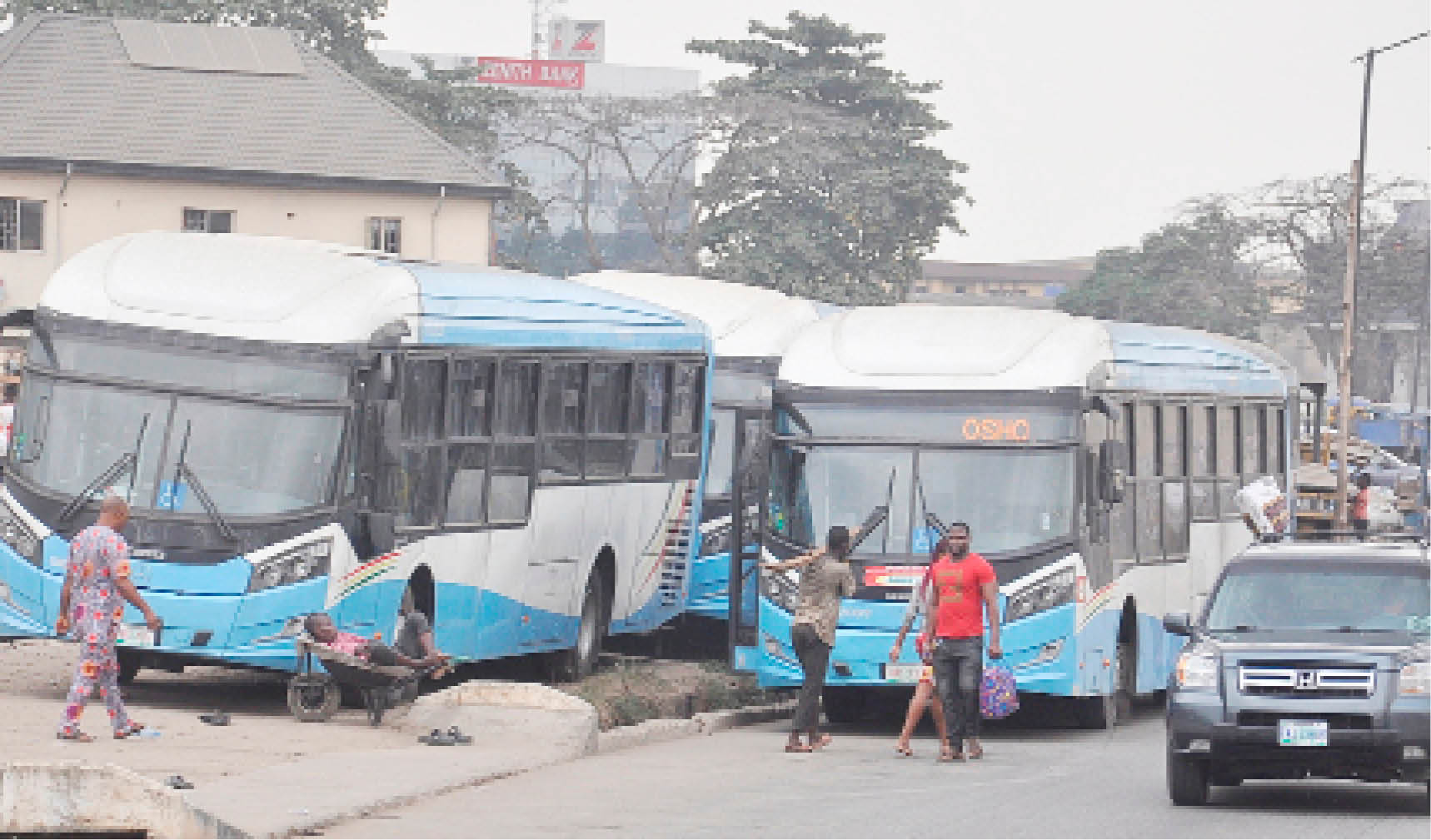Users of the Bus Rapid Transit (BRT) in Lagos State are facing some technical hitches in the operation of the e-ticketing system of payment the state government introduced to drive its cashless policy in the transportation sector. Daily Trust spoke with some of the users and operators.
In a bid to go cashless and integrate all transport modes on a single smart payment ecosystem, the Lagos State Government, in August last year, launched the ‘cowry card,’ an expanded e-ticketing system that automates fare payment for the Bus Rapid Transit (BRT).
The innovation seeks to create smart mobility through a cashless prepaid card as passengers can travel to different parts of the state, using the cowry card on any of the BRT. There is also the cowry app, from which money can be transferred to an individual wallet, then to the card for those who do not want to go to the ticketing point to load their cards.
- How clashes between Customs, smugglers claim lives in border communities
- 5 Reasons Why the New Universities Will Benefit the North
The Lagos BRT is a transport system regulated by the Lagos Metropolitan Area Transport Authority (LAMATA) and operated by Primero Transport Services Limited and the Lagos Bus Services Ltd (LBSL), among other operators.
Since its launch, the cowry card has been in use on the Oshodi to Abule-Egba and Ikotun to Ikeja BRT routes. It also became effective on bus services offered by Primero Transport Services Limited, operators of the Ikorodu to Teslim Balogun Stadium (TBS) BRT since February 1, 2021, as announced by the LAMATA.
The introduction of the cowry cards was embraced by many Lagosians, particularly those who rely largely on the BRT to move from one place to another within Lagos, since it is more convenient, cheaper, and there is less traffic because of the dedicated lanes for the BRT. In fact, it was gathered that most traders in the Computer Village who reside around Ikotun find it more convenient and cheaper travelling to and from work via the BRT with the use of cowry cards.
Findings by our correspondent showed that the cowry cards are in two categories, which cost N200 and N400. While that of N400 seems more qualitative like an ATM card, those of N200 is not as strong and durable as the former. So, after purchasing the card, passengers proceed to load it at any BRT bus terminal, and with it, can travel anywhere within the state without holding cash for fare payment.
According to the state government, the use of the card had become imperative to reduce cash transactions in transport operations to contain the spread of COVID-19.
The Managing Director of the LAMATA, Abimbola Akinajo, had earlier said the use of the cowry card would henceforth be the only mode of fare payment and administration of regulated transport services in the state.
She disclosed that the agency would launch a community bus scheme known as the First Mile and Last Mile (FMLM) as a feeder system to transport services on the main transport corridors, which will also use the cowry card. She added that the cowry cards would be extended to other transport services, including water and rail transportation next year.
As much as Lagosians embraced the cashless initiative, its adoption has not been without initial teething problems as some have complained about challenges associated with the use of the cowry card and the app.
Mr Alade Mudashir, a businessman in Lagos, pointed out that not all the buses have installed the payment metre, saying some routes like the Iyana-Ipaja to Ikeja still make use of the paper ticket, so also the Ikeja to Secretariat/Alausa routes and the Berger to Ikeja route, which means that people with the cowry card will still have to buy a ticket when travelling in the buses without the payment metre.
He also said there were times the payment metre took above the required fare rate from the card. “The machine sometimes takes N300 instead of N200, but before alighting from the bus, passengers are expected to tap the card on the validator (machine installed in the bus) so that it can refund N100. But instead of refunding, it sometimes shows ‘error,’ which makes some people in a hurry to forfeit their money,’’ he said.
Another resident, who gave his name as Obinna, said he topped up his wallet online, but unfortunately, it did not reflect on the card. He said he eventually had to queue at the ticketing point to top up his card.
Also, Margaret Osho complained on Facebook thus: “I don’t seem to understand the unexplainable deductions from my card. I boarded some buses and travelled short distances, tapped out at my destinations, instead of getting refunds on my card, I was told that the buses were ‘fixed fare.’ How can people identify the so-called ‘fixed fare buses,” she asked?
Also, Mr Peters Calvin said, “I used the app for the first time to board a bus from the Oshodi terminal to Cele. I had topped up N400, the tapper debited N400 for a N200 ride. There was no evidence of the transaction on the ride history as the app does not update in real-time. I will not recommend this app. I prefer using the card.”
However, there are few people who cannot afford, or have, for one reason or another, not purchased the cowry card. Instead of leaving this category of people stranded, Daily Trust Saturday observed that agents at the bus terminal load their personal cards, which they use to help people without cards gain access to the bus while they get paid.
Responding, Primero Transport Services Ltd apologised for some logistic hitches faced by commuters since the introduction of cowry cards for transport fare payment.
The Managing Director of the company, Mr Fola Tinubu, assured that his company was working with the state government to remove and resolve all the hitches.
He said, “Primero is not in charge of cowry cards. It is the Lagos State innovation for transportation transactions. A commuter can use this state-wide card in all regulated Lagos State buses. So, those who have some hitches in the switch should bear with us as we are working with Lagos State to perfect it,” he said.
According to him, “The card could be used across all routes in all buses being regulated by the state government, as well as on ferries and train when ready. So, in the long run, it will be good for everybody,”
Also responding, the spokesperson of the LAMATA, Mr Kolawale Ojelabi, explained that each bus carries two validators, which passengers are supposed to tap with their card when entering the bus and when alighting. He said it was important for passengers to tap in and tap out.
He pointed out that the system was configured such that if a passenger did not tap out, the machine would take the maximum fare instead of taking the exact fee, based on the distance travelled by the passenger. The system, he said, would enable passengers travelling shorter distances pay less once they tap out while alighting from the bus.
Commenting on the issue of loading money and not reflecting on the card, especially with the use of the app, he advised those who encountered such problem to visit the ticketing points at bus terminals to get it rectified. He said those who complained via mail and messages to the LAMATA have had their monies refunded.
He also stressed the need to visit the ticketing point so that the people could be guided on how to transfer money to the card, using the cowry app.
Ojelabi appealed to Lagosians to be patient as the agency is working assiduously towards rectifying all the hitches being encountered. He urged anyone who encounters difficulty in the use of the cowry card to report to the agency.

 Join Daily Trust WhatsApp Community For Quick Access To News and Happenings Around You.
Join Daily Trust WhatsApp Community For Quick Access To News and Happenings Around You.


